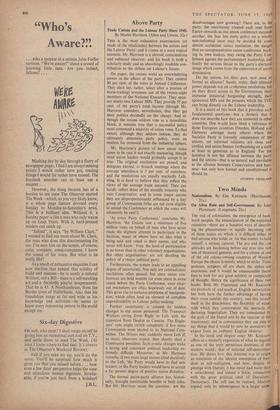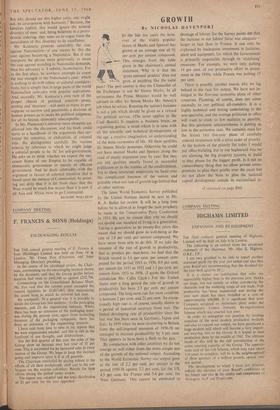Two Minds
On Alien Rule and Self-Government. By John Plamenatz. (Longmans, 21s.)
THE end of colonialism, the emergence of back ward peoples, the emancipation of the exploited countries—there are a hundred ways of describ ing the phenomenon—is rapidly becoming one of those topics on which it is difficult either to find anyone who holds, or, for that matter, to hold oneself, a serious opinion. The pro and the eon attitudes are hardening before our eyes into two sets of theatrical gestures, and for a citizen of one of the old colony-owning countries of Western Europe the choice is merely which to strike. Time, patience, tempers, all are short, the stakes are enormous, and it would be unseasonable there- fore to look for any great subtlety or complexity of thought. Hence the significance of these two books. Both Mr. Hamenatz and Mr. Kedourie are products of, and teach at, English universities, but both have the further advantage of having their roots outside this country, and this reveals itself in the detachment, the flexibility of mind, with which they contemplate the spectacle of declining Imperialism. They are unmolested by the guilt of the liberal and by the rancour of the reactionary, and in consequence they are able to say things that it would by now be unrealistic to expect from an ordinary English observer In his lucid and elegant essay Mr. Kedourie offers us a masterly exposition of what he regards as one of the truly pernicious doctrines of the modern world : that of national self-determina tion. He shows how this doctrine was in origin an extension of the Idealist conception of free dom as self-realisation, and how, despite its prestige with liberals, it has never had more than a coincidental, and indeed a fickle, connection with the great political ideal of liberalism' Democracy. The self can be realised, Idealists argued, only by submergence in a larger unit•
But why should not this higher unity, one might ask, be co-extensive with humanity? Because, the Idealists replied, this would ignore the natural diversity of men; and, being believers in a provi- dential ordering, they went on to argue from the • naturalness of this diversity to its excellence.
• Mr. Kedouric presents admirably the case against Nationalism—if one means by this the case against becoming a Nationalist. But if one ..interprets the phrase more generously, to mean the case against acceding to Nationalist demands, then his advocacy is I submit, inconclusive. For in the first place, he nowhere attempts to assess the real strength of the Na'tionalist's ease: which is nothing to do with ethnic or cultural considera- tions, but is simply that in large parts of the world .Nationalism coinzides with popular aspirations. And, secondly, Mr.- Kedourie's own view of the proper objects of political concern--peace, probity and 'measure'—will seem to many to pre- suppose so narrow and pessimistic a doctrine of human powers as to make his political judgment, for all its finesse, ultimately unacceptable.
In Mr. Plamenatz's universe more elements are allowed into the discussion, and his book could serve as a handbook of the arguments that sur- round the retention, or abdication, of colonial rule. He distinguishes carefully the various • criteria by reference to which we might judge a colonial people to be 'fit' for self-government. He asks us to think whether we expect the suc- cessor States of our Empire to be capable of democratic government or merely of efficient • government. And he deals admirably with the , argument in favour of colonial retention that is based upon the menace of Communism, by point- ing out drily that it is far from clear that the West would be much less secure than it is now if all Asia and Africa were to go Communist.
RICHARD WOLLHEIM











































 Previous page
Previous page